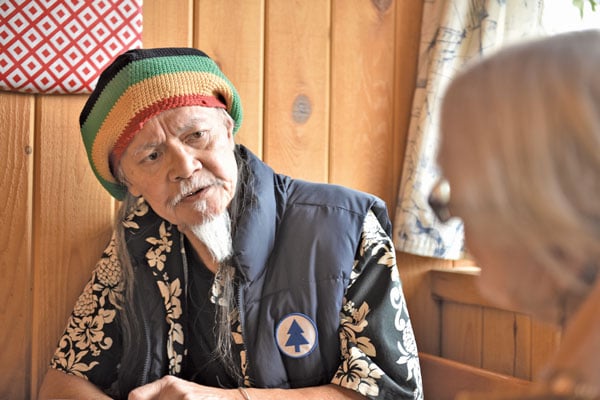“What is music?” is the first thing Mel Hing said as he sat down in Lulu’s to talk about his life and what brought him to the Key Peninsula. “It’s been turned into entertainment, but originally it was about communication. Before we had written language, it helped humans remember.”
Hing described himself as a jack of all music trades, and music has a been constant in his life. What has happened between his start with a violin in grade school and his current work as folk rock guitar technician (he modifies guitars to make the sound musicians seek and makes adjustments to accommodate aging hands) could fill a book. In fact, he said he is writing a book, which he will call “Yellow Mustard.”
Now 80, Hing grew up in Seattle’s south end, the black sheep in a family of Chinese immigrants with ties to the business and restaurant community. His father was a chef with the Four Seas and owned the Jade Pagoda, and wanted him to go into business. “But music was my shelter, companion, friend and teacher,” he said. When Count Basie donated his repaired upright double bass to Hing’s middle school, he was hooked. Later, he played strings in the band at Garfield High School.
He also worked at his uncle’s electronics repair shop during high school. He became an electronics technician, but music was his passion. Hing discovered jazz and blues in the clubs in Seattle’s Central District. “I hung out after gigs and learned,” he said.
He married and left music for a while, worked full-time in electronics and tried to start his own business. His marriage fell apart, and he returned to his old haunts. He worked as a watcher in the gambling clubs, and after hours he joined the music scene, first as a side gig and then full time as a roadie for some Seattle bands. “I basically traded a gun for a guitar,” Hing said. “I was responsible for getting all the equipment onto the stage, making sure it worked, fixing it if I could and knowing where to get it fixed if I couldn’t.”
Hing thought the Seattle music world of the time was a snob scene. Intrigued by what he heard about Haight-Ashbury, he moved to San Francisco in the Sixties. He connected with Chet Helms, the promoter who founded the Family Dog production company, operated the Avalon Ballroom and recruited Janis Joplin to Big Brother and the Holding Company. “It was a magic carpet ride,” Hing said.
He drove and provided security for Helms, wrote music, and worked closely with lead guitarist James Gurley, refining his guitar tech skills. He regarded Joplin as a close friend and mingled with just about every big name that passed through, including Jerry Garcia, Bob Dylan, Mike Bloomfield and Ram Dass. Money flowed and it was a star-studded life.
Then Joplin died. Hing said that with her death he felt like the San Francisco music scene ended. He moved to Los Angeles and spent time in Big Sur. He worked when he could, but described that time as a blur. There were a number of deaths from overdoses, and paying bail for others ate up any extra money. His beloved pet wolf Mojo died. John Lennon’s death in 1980 was the last straw for him, and he moved to Hawaii.
A friend introduced Hing to the slack-key Hawaiian guitar, and music returned to its critical role in his life. He volunteered at the university radio station and started the Monday Night Live program, which continues to this day. He helped remaster recordings for Hula Records, opened his guitar tech business, and discovered good nutrition and aquaponics.
Then, last year, after a 27-year separation, he found that his mother needed him. Now 102, she lives in Lynnwood, and though her mind is intact, her body is failing. His good friend, Palmer Lake resident Tom Murphy, who drummed with the Robert Cray Band, found a place for him to stay on the Key Peninsula in July.
The move has had its challenges. Hing had hoped to have a place to run his guitar tech business but that has not worked out yet, and his car broke down, making it hard to get to his mother. But the community stepped in.
At lunch at Key Peninsula Community Services, he learned about The Mustard Seed Project and connected with a few resources. Volunteer driver Larry Bingham took him to Lynnwood once a week. Financial help from the Gig Harbor FISH food bank and St. Vincent de Paul in Tacoma helped cover the costs of replacing an engine. And, in turn, he took a look at the sound system at the Longbranch Improvement Club and offered some advice.
Hing said he’s one of the last people standing from those heady San Francisco days. Although he lived the same hard life as the others, he thinks that staying under the radar is what kept him alive. Despite the cold and dark, Hing said he likes the Key Peninsula. “Everyone here is really cool. I’m meeting people my age who could care less about rock stars, and I like that.” He’s not sure about what the future holds, but he could see this as a place to settle.



